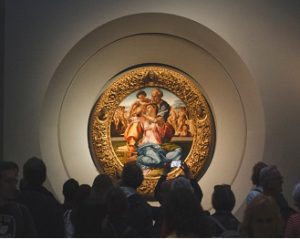Luke 20: 27-38
These Sadducees were a tricky bunch.
 Jesus has spent the last few chapters of Luke turning upside down the values of this world with parables about short tax collectors, a man with a seemingly dysfunctional vineyard and disrupting the economy of the Temple and now the Sadducees were determined to trip him up with their view of Moses’ teachings on marriage and the afterlife. How was Jesus going to tackle this one?
Jesus has spent the last few chapters of Luke turning upside down the values of this world with parables about short tax collectors, a man with a seemingly dysfunctional vineyard and disrupting the economy of the Temple and now the Sadducees were determined to trip him up with their view of Moses’ teachings on marriage and the afterlife. How was Jesus going to tackle this one?
Firstly a bit of background on who the Sadducees were and why they were even asking this seemingly bizarre question.
The Sadducees were a sect of the Jews who were considered the elites of the day. They were fewer in number than the Pharisees but considered to be more powerful and influential. They were the group given oversight responsibilities for the temple and from this group the high priest was chosen. They prided themselves on their defence of the Law of God and were champions of Moses’ teachings as they looked to His writings as the authoritative written body of the Old Testament. They rejected all miracles and the supernatural power of God.
So, in summary full of ego and self-righteousness. They weren’t asking Jesus questions in order to learn and expand their understanding, they were looking to trip him up, make a fool out of him and ultimately to prove themselves right.
When we come across someone with a different opinion to us, someone who has made different choices to us, I wonder if we don’t have slight echoes of the same? Do we ask questions with an open inquisitive stance or are we just trying to steer the conversation in a direction to prove our own point?
The Sadducees have their feet very firmly planted in the here and now. They don’t believe in heaven they don’t believe in life after death so who the widow marries is surely of no interest to them. They are also taking Moses words out of context.
Moses’ Law that they quote as laid out in Leviticus was to prevent the extinction of family – which was one of the worst outcomes when living in a hostile and challenging environment. Although it may seem alien and misogynistic to our 21st century ears, it was done to ensure the survival of a particular clan or tribe. Something that is clearly not needed in heaven – where there is no death, no tears and no war to wipe us out.
In response, Jesus points them back to their hero Moses to counter their disbelief in the afterlife. Verse 37 says, “And the very fact that the dead are raised Moses himself showed, in the story about the bush, where he speaks of the Lord as the God of Abraham, the God of Isaac, and the God of Jacob. Now he is God not of the dead, but of the living; for to him all of them are alive”.
Close-minded, egotistical, self-righteous, power obsessed and unwilling to hear or to change, the Sadducees where not to be convinced. History shows us that eventually the Sadducees died out but I’m not sure that their moral judgements and character traits have.
We see leaders, those with authority in the political and religious sphere, people we know perhaps, who exhibit much of the same. We still have our feet and minds planted firmly in the here and now with very little capacity for the bigger picture, the eternal landscape.
Life is a paradox.
We have to live, survive, and hopefully flourish in the here and now – but how do we do this when there is much turmoil and unrest in the world? Perhaps one way is to remember that we are part of the eternal landscape.; one small dab of paint on a beautifully crafted masterpiece; that we are importantly insignificant.
Each hair on our head is counted, we were formed in our mothers womb and yet we are but a grain of sand or one of a trillion stars in the sky. Infinitely loved and treasured before, now and after. We are not the author of this book but merely a character passing through. Put simply – we are not in control – God is.
When we can muster enough humility to accept this and surrender to a power greater than us then we can finally taste the peace that passes all understanding.
Personally, I began to experience this in November 2010 when my life had become unmanageable, and I could not find peace. I decided to let God have a go at running my life as I wasn’t having much luck. I hit my knees and surrendered, and I do this every morning, acknowledging that I am not in control and turning my life and my will over to him. I have a part to play, it is not a passive surrender, I have choices to make and a life to live. But to know that, in the end, it will all be ok, whatever happens, is an overwhelming relief.
The Sadducees never got to experience this peace. They held on tightly to power, control, and a sense of self-righteousness. For them this world was all there was, and they held on to it for dear life, acting out of fear and self-imposed authority.
We have a choice. To believe that this is not all there is, to relinquish our control to a God who is love and who has a plan, even if we can’t see it, or to hold onto this one and only existence with fear and anxiety constantly afraid of what is to come. If we believe in eternal life, as we will state in the creed in a moment, then surely this changes our perspective on our life today? Can we be brave enough to take a step back and trust that the artist is painting a masterpiece of which we are a tiny but very important part?
Creator God, you are the Alpha and the Omega, you know the beginning and the end, help us to trust in your love, your compassion, your gentleness and your kindness. As a boy says in Mark’s Gospel, ‘I believe; help my unbelief’. In Jesus name we pray. Amen
Abinger Common, Surrey RH5 6HZ ///delay.trials.plans
Tel: 01306 737160


Data Protection & Privacy
We do not track any browsing activity on this website.
We may sometimes link to external sites and social media but are not responsible for the content of these websites and you should refer to their individual privacy and cookies policies.
If you are included in an event photo and do not wish to be please contact us and we will remove – Contact Us

If you would like to apply for a Login account to help update this site, please email the web team here.